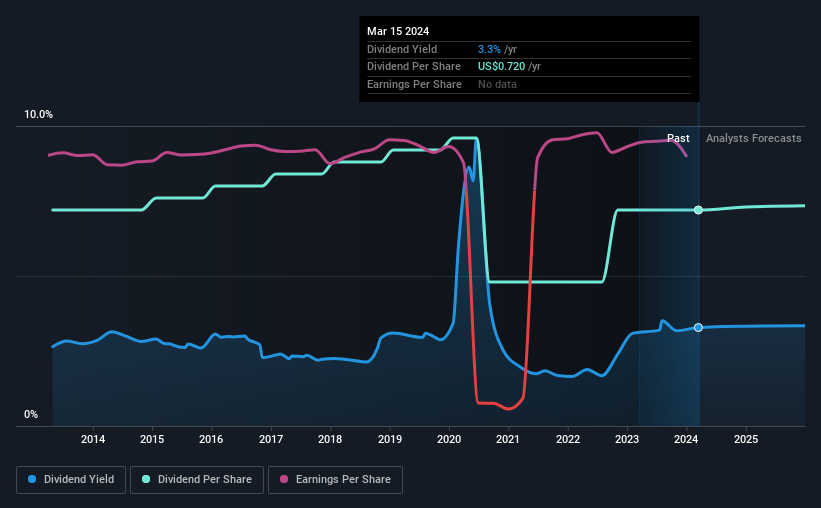Income Investors Should Know That Berkshire Hills Bancorp, Inc. (NYSE:BHLB) Goes Ex-Dividend Soon
Readers hoping to buy Berkshire Hills Bancorp, Inc. (NYSE:BHLB) for its dividend will need to make their move shortly, as the stock is about to trade ex-dividend. The ex-dividend date is one business day before a company's record date, which is the date on which the company determines which shareholders are entitled to receive a dividend. The ex-dividend date is important as the process of settlement involves two full business days. So if you miss that date, you would not show up on the company's books on the record date. Thus, you can purchase Berkshire Hills Bancorp's shares before the 20th of March in order to receive the dividend, which the company will pay on the 4th of April.
The company's next dividend payment will be US$0.18 per share, on the back of last year when the company paid a total of US$0.72 to shareholders. Based on the last year's worth of payments, Berkshire Hills Bancorp stock has a trailing yield of around 3.3% on the current share price of US$21.94. Dividends are a major contributor to investment returns for long term holders, but only if the dividend continues to be paid. We need to see whether the dividend is covered by earnings and if it's growing.
See our latest analysis for Berkshire Hills Bancorp
Dividends are typically paid out of company income, so if a company pays out more than it earned, its dividend is usually at a higher risk of being cut. That's why it's good to see Berkshire Hills Bancorp paying out a modest 45% of its earnings.
When a company paid out less in dividends than it earned in profit, this generally suggests its dividend is affordable. The lower the % of its profit that it pays out, the greater the margin of safety for the dividend if the business enters a downturn.
Click here to see the company's payout ratio, plus analyst estimates of its future dividends.
Have Earnings And Dividends Been Growing?
When earnings decline, dividend companies become much harder to analyse and own safely. Investors love dividends, so if earnings fall and the dividend is reduced, expect a stock to be sold off heavily at the same time. Readers will understand then, why we're concerned to see Berkshire Hills Bancorp's earnings per share have dropped 7.1% a year over the past five years. When earnings per share fall, the maximum amount of dividends that can be paid also falls.
Many investors will assess a company's dividend performance by evaluating how much the dividend payments have changed over time. It looks like the Berkshire Hills Bancorp dividends are largely the same as they were 10 years ago. When earnings are declining yet the dividends are flat, typically the company is either paying out a higher portion of its earnings, or paying out of cash or debt on the balance sheet, neither of which is ideal.
Final Takeaway
Has Berkshire Hills Bancorp got what it takes to maintain its dividend payments? Earnings per share have shrunk noticeably in recent years, although we like that the company has a low payout ratio. This could suggest a cut to the dividend may not be a major risk in the near future. In sum this is a middling combination, and we find it hard to get excited about the company from a dividend perspective.
If you're not too concerned about Berkshire Hills Bancorp's ability to pay dividends, you should still be mindful of some of the other risks that this business faces. For example, we've found 2 warning signs for Berkshire Hills Bancorp that we recommend you consider before investing in the business.
If you're in the market for strong dividend payers, we recommend checking our selection of top dividend stocks.
Have feedback on this article? Concerned about the content? Get in touch with us directly. Alternatively, email editorial-team (at) simplywallst.com.
This article by Simply Wall St is general in nature. We provide commentary based on historical data and analyst forecasts only using an unbiased methodology and our articles are not intended to be financial advice. It does not constitute a recommendation to buy or sell any stock, and does not take account of your objectives, or your financial situation. We aim to bring you long-term focused analysis driven by fundamental data. Note that our analysis may not factor in the latest price-sensitive company announcements or qualitative material. Simply Wall St has no position in any stocks mentioned.

